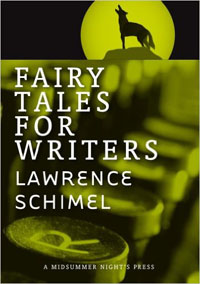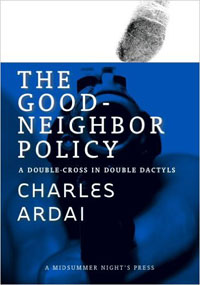We are very fond of small presses here at Green Man Review, not least because they publish some of the most interesting things out there. Several years ago, A Midsummer Night’s Press was revived after a fairly lengthy hiatus. The press focuses on poetry, and we were happy to be able to take a look at the first two offerings, Lawrence Schimel’s Fairy Tales for Writers and Charles Ardai’s The Good-Neighbor Policy.
 Lawrence Schimel’s Fairy Tales for Writers is a short collection of traditional tales transplanted into the world of writing and publishing. As a poetic treatment of the told-again fairy tale it more than holds its own, with the added bonus of some wry and sometimes acidic humor. The characters drawn are all too familiar — the Wicked Queen from Snow White who runs a writers’ workshop; the young Ugly Duckling in a family that simply has no time for his imperatives, until at last he discovers a world in which words are, indeed, things of beauty; and any number of agents and publishers in sheeps’ clothing.
Lawrence Schimel’s Fairy Tales for Writers is a short collection of traditional tales transplanted into the world of writing and publishing. As a poetic treatment of the told-again fairy tale it more than holds its own, with the added bonus of some wry and sometimes acidic humor. The characters drawn are all too familiar — the Wicked Queen from Snow White who runs a writers’ workshop; the young Ugly Duckling in a family that simply has no time for his imperatives, until at last he discovers a world in which words are, indeed, things of beauty; and any number of agents and publishers in sheeps’ clothing.
It’s not all gloom — there are touches of mercy, acts of simple kindness, those who still think there is room for art that doesn’t sell (sounds like a small press to me) that provide some happy moments. I’m quite taken with this one — for a poetry junky like yours truly, this is a wonderful little chapbook, nothing radical, just good solid verse with a firm lock on what fairy tales are about.
 Charles Ardai’s The Good-Neighbor Policy is something different. One wants it to be a murder mystery, but it’s not, except on the surface. A morality tale perhaps, of the darker variety — a gang shootout, the only survivor the wife of the couple under the federal Witness Protection Program, attacked at home by hit men who become victims themselves, all witnessed by a lonely neighbor who couldn’t see the key events. The question is, who killed who?
Charles Ardai’s The Good-Neighbor Policy is something different. One wants it to be a murder mystery, but it’s not, except on the surface. A morality tale perhaps, of the darker variety — a gang shootout, the only survivor the wife of the couple under the federal Witness Protection Program, attacked at home by hit men who become victims themselves, all witnessed by a lonely neighbor who couldn’t see the key events. The question is, who killed who?
I can’t say I’m so happy with this one, if only because it becomes a morality tale rather than a mystery. Because of that there’s little real tension, few surprises, and, although entertaining enough, the story is a foregone conclusion from fairly early on. There’s a way it has to turn out, and it does so just that way. This is not to say I have serious objections — it’s an entertaining enough piece, and as Henry Kuttner said (to paraphrase), if you’re not going to entertain people, everything else is wasted.
So, a creditable renascence for A Midsummer Night’s Press: obviously, a press to watch out for.
(Both from A Midsummer Night’s Press, 2007)
